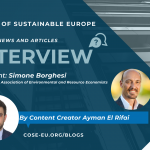Written by: Ayman El Rifai
Reading time: 5 minutes
The Role of Consumer Behavior in Achieving Sustainability
Nowadays, one of the major reasons behind our industrialized world’s environmental issues is consumer behavior since more than half of greenhouse gas emissions emerge from household consumption. Thus, a deviation in both consumer behavior and lifestyle is essential to achieve sustainability and tackle climate change. One of the most famous slogans in this context is “think globally, act locally”, which reminds people that big achievements start from small steps, and encourages people to start acting more sustainably on the individual level while having and maintaining a bigger long-term vision that involves all communities around the globe in fighting climate change.

Think Global Act Local
The change is in consumer behavior
Fortunately, statistics show that sustainability has been the most recent customer trend. A study done by Deloitte shows that people from all generations are adopting a more sustainable lifestyle and lists the notable changes in their purchasing routine. The most prominent change is the decrease in the use of single-use plastic, with over two-third of consumers limiting the use of such waste. The second notable change is the shift to purchasing from brands with sustainable and eco-friendly values. More than a third of Deloitte’s survey respondents said they started buying fewer new products, consumed fewer animal products, and bought from brands that are known for their ethical values and practices. Some less remarkable changes in the consumer’s behavior are switching to renewable energy resources and reducing air travel, with only one-fifth of responders claiming so.
The social effect
Since people are social creatures who get highly influenced by others, consumers always tend to imitate each other’s actions and behaviors. Thanks to green marketing and the inclusion of eco-friendly products in the markets, many environmentally aware people switch to these products. Thanks to word of mouth, or even the hiring of a brand ambassador, the proportion of these products’ market share has been increasing in the past decade. It is important to mention that a consumer’s behavior is not limited to their product purchasing habits, but also to their routine actions. Adopting a healthy and sustainable lifestyle such as decreasing car usage or electricity consumption per person will eventually lead to the embracement of sustainability. When people are aware that every effort matters, they will start taking action on the individual level by making better choices, which will bring them happiness and pride. For that reason, it is crucial for companies to provide buyers with the exact right information and to be consistent in the goods and services they offer as well as the ethics and values stand by.
Consumers not embracing sustainability
For a big proportion of the consumers, and due to many reasons, embracing sustainability is not something they are willing to for, according to Deloitte. The main reason, however, is the consumers’ lack of interest in the topic of sustainability, while others might not have enough information about it. For other people, buying local products or switching to eco-friendly and renewable energy goods is too expensive. In addition to that, many buyers believe that it is very complicated and time consuming to adapt a sustainable purchasing behavior and others claim that sustainable products are not available in their local area.
The future of sustainable consumer behavior
In a perfectly sustainable world, all products in markets across the globe should be environmentally friendly and ethically produced. A real-life example of an actual supermarket that only sells these kinds of products is a Swiss chain named Migros, which has earned its customer’s loyalty and trust. In order to have all supermarkets follow Migros’s strategy, it is the public’s responsibility to inform brands that they are willing to spend money on sustainable products and to put pressure on the ones producing goods that are damaging to the environment.
 “Ayman El Rifai is our content creator from Lebanon with a Bachelor’s degree in Business Administration from the American University of Beirut. He joined Circle of Sustainable Europe (CoSE) because he believes in the importance of adopting a sustainable approach in our everyday activities and on the corporate and governmental levels.”
“Ayman El Rifai is our content creator from Lebanon with a Bachelor’s degree in Business Administration from the American University of Beirut. He joined Circle of Sustainable Europe (CoSE) because he believes in the importance of adopting a sustainable approach in our everyday activities and on the corporate and governmental levels.”
References:


